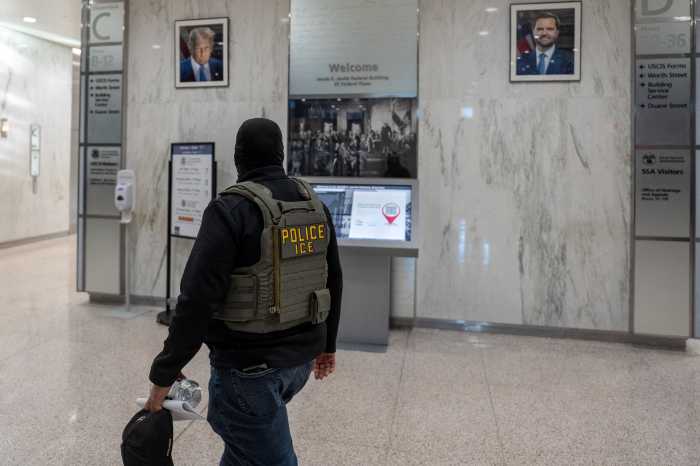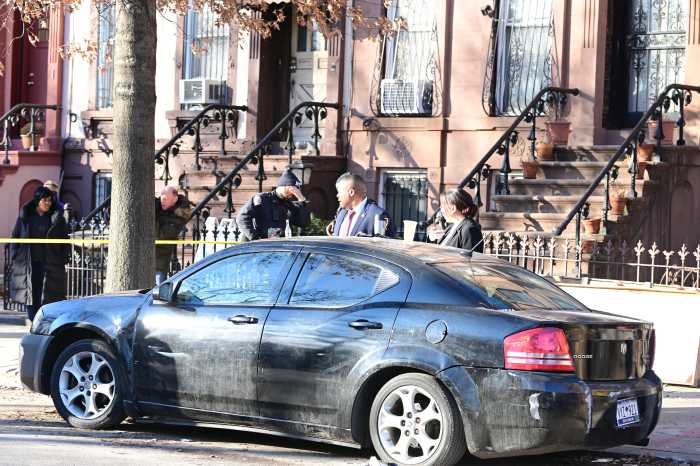Edie Windsor at a June 7 press conference at the New York Civil Liberties Union celebrating her victory in court over DOMA. | DONNA ACETO
Following hard on the petitions filed by the Bipartisan Legal Advisory Group of the House of Representatives (BLAG) and the US solicitor general to get the Supreme Court to take up the constitutionality of the Defense of Marriage Act (DOMA), the LGBT Rights Project at the American Civil Liberties Union has filed a petition asking the Court to hear Edith (Edie) Windsor’s case as well.
The ACLU petition was filed on July 16.
Windsor, whose same-sex spouse, Thea Spyer, died in 2009, sued for refund of estate taxes totaling more than $360,000 due because the Internal Revenue Service would not recognize their marriage as valid. On June 6, US District Judge Barbara S. Jones, based in Manhattan, ruled that Section 3 of DOMA, which bars federal recognition of otherwise valid same-sex marriages, violates the equal protection requirement of the Fifth Amendment.
BLAG — which is controlled by Republican House Speaker John Boehner and has been defending Section 3 in numerous cases since the Justice Department, in early 2011, concluded the law is unconstitutional — immediately filed for review in the Second Circuit Court of Appeals, also based in Manhattan. The Justice Department, representing the government and urging that Jones’ ruling be upheld, promptly sought review as well.
Windsor’s attorneys originally filed a petition asking the Second Circuit to expedite the appeal in light of her age — she is 83 — and ill health, resulting in a short briefing schedule with oral argument expected to be held the week of September 24.
But events have moved quickly on the DOMA front. In the past few weeks, BLAG and the solicitor general filed petitions in the Supreme Court seeking review of Massachusetts v. US Department of Health and Human Services, in which the Boston-based First Circuit Court of Appeals upheld a district court ruling that found Section 3 unconstitutional.
The solicitor general also petitioned the high court to grant review in Golinski v. Office of Personnel Management, in which a trial court in San Francisco held Section 3 unconstitutional and an appeal is pending before the Ninth Circuit Court of Appeals.
In both cases, the solicitor general is arguing the high court should affirm the lower court rulings striking down DOMA.
By mid-July, it was apparent the issue of Section 3’s constitutionality will be before the Supreme Court during its October 2012 term, since it generally grants petitions filed by the solicitor general seeking review of cases where lower courts have declared federal statutes unconstitutional.
It was time, the ACLU concluded, for it to get into the game as well. Gay & Lesbian Advocates & Defenders, a Boston-based LGBT public interest firm with a strong record of marriage litigation in New England, represents the plaintiffs in the First Circuit case, while Lambda Legal, which works nationally, represents Karen Golinski, an employee of the Ninth Circuit Court of Appeals who sued when the federal government denied her lesbian spouse benefits that different-sex spouses of court employees enjoy.
The ACLU represents Windsor with the cooperation of attorneys from Paul Weiss Rifkin Wharton & Garrison LLP and the New York Civil Liberties Union. The group enlisted the assistance of the Supreme Court Litigation Clinic at Stanford Law School in their petition arguing that the Supreme Court should take Windsor’s case as well.
The ACLU petition reiterated arguments made in other DOMA petitions to the Court about the importance of achieving a nationwide ruling on Section 3’s constitutionality, but also pressed the additional point that her case requires expedited review. Windsor’s victory in the district court will not result in any relief regarding the hundreds of thousands of dollars she has paid the IRS until all appeals are exhausted, and having to go to the Second Circuit does not make sense when the issue will be resolved only before the Supreme Court. As the petition notes, Windsor, not her estate, should get the relief she is seeking.
The petition also noted that lower federal courts have taken different approaches in evaluating Section 3, and the Windsor ruling differs from the other two cases being presented to the high court for review.
The First Circuit ruling said that Section 3 would survive if DOMA were accorded ordinary rational basis review, under which the plaintiffs would be required to show that the statute had no reasonable basis. That court applied a more demanding standard to the 1996 statute, citing the federalism concerns raised by the Commonwealth of Massachusetts in its lawsuit that was consolidated with GLAD’s case. Massachusetts argued that DOMA required it to discriminate against one class of married couples in the state regarding programs it jointly administered with the federal government.
The district court in Golinski said that sexual orientation claims merit heightened judicial scrutiny, under which the government must demonstrate a compelling interest that cannot be met without burdening the plaintiffs’ class. The court’s ruling staked out a position beyond any previously taken by the Ninth Circuit Court of Appeals, which has been relying on a 20-year old precedent that seems outdated by subsequent Supreme Court rulings — in the 2003 Lawrence v. Texas sodomy case and the 1996 Romer v. Evans case that threw out a Colorado voter initiative that barred the state and its localities from adopting gay rights protections.
The Second Circuit has to date taken no position on the level of judicial scrutiny appropriate for sexual orientation discrimination claims. Judge Jones, in her Windsor ruling, determined that in the absence of circuit precedent, she should use rational basis review but apply “more searching” scrutiny, as former Justice Sandra Day O’Connor described in her concurring opinion in the Lawrence sodomy ruling. O’Connor argued “more searching” scrutiny is appropriate in evaluating laws that “exhibit… a desire to harm a politically unpopular group.”
The ACLU points out that the high court could, theoretically at least, affirm Jones without deciding whether sexual orientation discrimination claims should be subjected to a higher level of scrutiny, sidestepping this question as it did in the Colorado Romer v. Evans decision.
Whether the Court will be enticed by a case that offers the opportunity to make a relatively narrow ruling rather than broader ruling on the overall question of anti-gay discrimination is uncertain. The pressure to grant at least one of the DOMA petitions now pending, however, has become very strong — not least because BLAG feels obliged to intervene in every case challenging Section 3 and those cases are proliferating.
A class action was just filed in federal court in Los Angeles on behalf of a binational same-sex married couple challenging DOMA’s application in immigration law, and similar cases are pending in Chicago and Brooklyn. Cases are also pending challenging the exclusion of same-sex military spouses from the usual benefits accorded military spouses.
As long as the Obama administration takes the position it is obliged to enforce Section 3 until it is definitively ruled unconstitutional, more and more of these cases will arise. The question needs to be answered on a national basis, and it’s time for the Supreme Court to act.
Granting all the pending petitions would be efficient, relieving the Ninth and Second Circuits of having to invest judicial resources in deciding a question that will no doubt be before the Court in the First Circuit case during its term beginning in October.




































